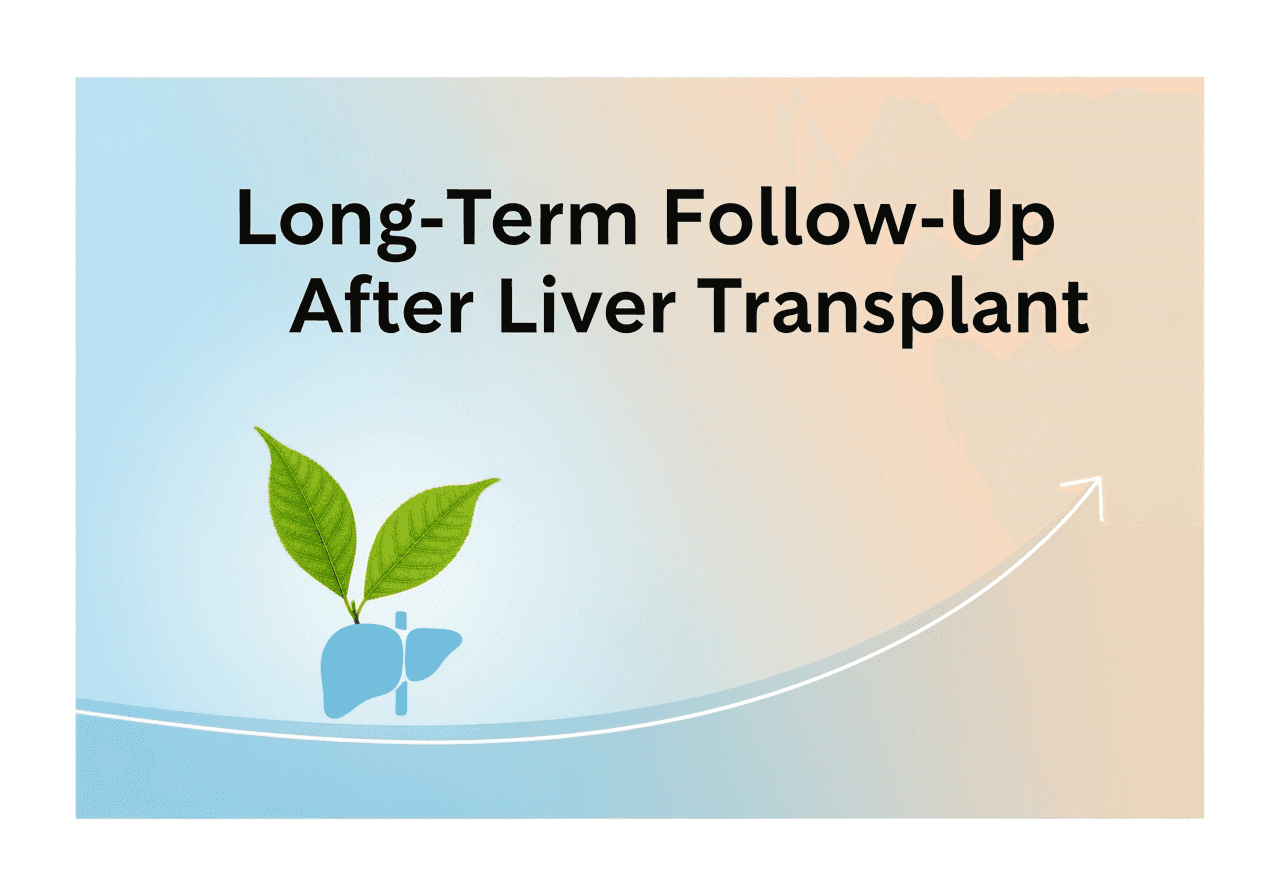
Long-Term Follow-Up After Liver Transplant
31 Oct, 2025
 Healthtrip
Healthtrip- Why is Long-Term Follow-Up After Liver Transplant Important?
- Where Can You Receive Long-Term Liver Transplant Follow-Up? < li>Who is Involved in Your Long-Term Care Team?
- What to Expect During Follow-Up Appointments?
- Lifestyle Adjustments and Long-Term Health Management < li>Potential Long-Term Complications and Their Management
- Patient Stories and Experiences
- Conclusion
The Importance of Regular Check-Ups
After receiving a liver transplant, consistent and thorough follow-up appointments are absolutely crucial. These check-ups allow your medical team to monitor the health of your new liver and address any potential issues early on. During these appointments, you can expect comprehensive blood tests to assess liver function, imaging studies like ultrasounds or MRIs to visualize the liver's structure, and careful evaluation of your overall health. The frequency of these check-ups will gradually decrease over time, but they remain a vital part of your long-term care plan. These visits also offer a valuable opportunity to discuss any concerns or changes you may be experiencing with your healthcare providers at hospitals such as Yanhee International Hospital or Vejthani Hospital. Regular communication helps ensure that you receive personalized care tailored to your specific needs. Remember, staying proactive and engaged in your healthcare is one of the best ways to protect your new liver and enjoy a healthier life. Missing appointments or delaying necessary tests can lead to complications that could have been prevented with timely intervention. It's all about staying one step ahead and maintaining a strong partnership with your medical team.
Most popular procedures in India
Medication Management: A Lifelong Commitment
One of the most important aspects of long-term follow-up after a liver transplant is medication management, specifically the use of immunosuppressants. These medications are essential to prevent your body from rejecting the new liver. Adhering strictly to your prescribed medication regimen is absolutely critical, as even a slight deviation can trigger rejection. It's essential to understand the purpose of each medication, potential side effects, and how to manage them effectively. Regular blood tests are necessary to monitor drug levels and ensure they are within the therapeutic range. Your transplant team, potentially at facilities like Saudi German Hospital Cairo or Fortis Hospital, Noida, will work closely with you to adjust dosages as needed and address any concerns you may have. Never adjust your medication dosage without consulting your doctor. Remember, these medications are your liver's best friends, constantly working to protect it from your immune system's natural defenses. Think of them as a security detail for your liver, ensuring its safety and well-being for years to come. Proper medication management is a lifelong commitment, but it's a commitment to a healthier, longer life.
Recognizing and Managing Complications
While liver transplantation offers a chance at a healthier life, it's important to be aware of potential complications that can arise in the long term. These complications can range from infections and biliary problems to the development of metabolic issues or even certain types of cancer. Recognizing the signs and symptoms of these complications early on is crucial for prompt treatment and better outcomes. This is where constant communication with doctors from hospitals such as NMC Specialty Hospital, Al Nahda, Dubai, or Bangkok Hospital becomes imperative. Be vigilant about reporting any new or unusual symptoms to your healthcare team promptly. This could include fever, abdominal pain, jaundice (yellowing of the skin or eyes), swelling, or changes in urine or stool color, among other things. Regular check-ups and screenings are also essential for early detection of potential problems. Managing complications often involves a multidisciplinary approach, including medications, lifestyle modifications, and, in some cases, further interventions. Remember, early detection and prompt treatment are key to minimizing the impact of any complications and maintaining the long-term health of your transplanted liver. Stay proactive, stay informed, and stay connected with your medical team.
Wellness Treatments
Give yourself the time to relax
Lowest Prices Guaranteed!

Lowest Prices Guaranteed!
Lifestyle Adjustments for Long-Term Health
In addition to regular check-ups and medication management, adopting a healthy lifestyle is essential for maximizing the long-term success of your liver transplant. This includes making conscious choices about your diet, exercise, and overall well-being and perhaps leveraging services available at hospitals like Quironsalud Hospital Murcia or Memorial Bahçelievler Hospital. A balanced diet rich in fruits, vegetables, lean proteins, and whole grains can help support liver function and overall health. Avoiding excessive alcohol consumption and maintaining a healthy weight are crucial for preventing further liver damage. Regular physical activity can improve cardiovascular health, boost your immune system, and enhance your overall quality of life. It's also important to manage stress levels through relaxation techniques like yoga, meditation, or spending time in nature. Remember that these lifestyle adjustments are not just about physical health; they also play a vital role in your emotional and mental well-being. Engaging in activities you enjoy, connecting with loved ones, and seeking support when needed can help you navigate the challenges of life after transplant. Think of your lifestyle as the foundation upon which your long-term health is built. Small, consistent changes can make a big difference in the long run. You are not alone in this journey.
The Role of Support Systems
Navigating life after a liver transplant can be emotionally and physically challenging, and having a strong support system is invaluable. This support can come from family, friends, support groups, or even online communities. Sharing your experiences with others who have gone through similar situations can provide emotional comfort, practical advice, and a sense of belonging. It's also important to communicate openly with your healthcare team about any emotional or psychological challenges you may be facing. Many transplant centers, like Singapore General Hospital and LIV Hospital, Istanbul, offer counseling services and support groups specifically for transplant recipients and their families. Don't hesitate to reach out for help when you need it. Remember, you don't have to go through this alone. Lean on your support system for encouragement, understanding, and practical assistance. They can provide a listening ear, help you with daily tasks, or simply offer a comforting presence during difficult times. Building and nurturing your support network is an investment in your long-term well-being and can make a significant difference in your overall quality of life. Surrounding yourself with positive and supportive people can help you stay motivated, cope with stress, and celebrate your successes along the way.
Why is Long-Term Follow-Up After Liver Transplant Important?
Undergoing a liver transplant is a monumental achievement, offering a new lease on life and a chance to reclaim health and well-being. However, the journey doesn't end with the surgery itself. Long-term follow-up care is an absolutely critical component of successful liver transplantation, ensuring that the transplanted organ functions optimally and that any potential complications are identified and addressed promptly. Think of it as tending a delicate garden; the initial planting is crucial, but consistent care and vigilance are essential for the plants to thrive. Without regular monitoring and management, the risk of graft rejection, infections, and other post-transplant complications significantly increases, potentially jeopardizing the long-term success of the transplant. So, while you might feel like celebrating the end of one chapter, remember that long-term follow-up is the beginning of a new, healthier one, filled with possibilities and requiring dedicated attention.
The importance of long-term follow-up stems from several key factors. First and foremost, it allows doctors to monitor the function of the new liver. Regular blood tests and imaging studies can detect early signs of rejection, even before you experience any noticeable symptoms. Early detection is paramount because prompt treatment can often reverse or mitigate the rejection process, preserving the health of the graft. Furthermore, immunosuppressant medications, which are crucial for preventing rejection, can have side effects that need careful management. These medications can increase the risk of infections, kidney problems, and even certain types of cancer. Through consistent follow-up, your medical team can adjust medication dosages, prescribe preventive treatments, and screen for potential side effects, ensuring that you receive the safest and most effective care possible. In essence, long-term follow-up is your safety net, providing ongoing support and guidance to help you navigate life after transplantation with confidence and peace of mind. Healthtrip understands the critical nature of comprehensive post-transplant care, and we are committed to connecting you with the best healthcare providers for your long-term needs.
Beyond the immediate physical health aspects, long-term follow-up also addresses the emotional and psychological well-being of transplant recipients. The transplant journey can be incredibly stressful, filled with uncertainty and anxiety. Regular contact with a dedicated medical team provides a sense of security and allows you to address any concerns or fears that may arise. Moreover, transplant centers often offer support groups and counseling services, creating a community where you can connect with other individuals who have undergone similar experiences. Sharing your journey with others who understand can be incredibly empowering and can help you cope with the emotional challenges of transplantation. Long-term follow-up, therefore, is not just about monitoring your physical health; it's about nurturing your overall well-being and empowering you to live a fulfilling and healthy life after transplant. Healthtrip recognizes this holistic approach to care and strives to connect you with resources that address both your physical and emotional needs, ensuring a smoother and more successful recovery journey.
Where Can You Receive Long-Term Liver Transplant Follow-Up?
Navigating the world of post-liver transplant care can feel overwhelming, especially when considering where to receive the necessary long-term follow-up. Fortunately, several reputable medical facilities across the globe specialize in providing comprehensive care for transplant recipients. Depending on your location, insurance coverage, and specific medical needs, you have a range of options to choose from. Typically, the transplant center where you underwent your initial surgery will be your primary source of long-term care. These centers have established protocols and experienced teams familiar with your medical history, making them well-equipped to manage your post-transplant needs. However, if you relocate or prefer to seek care closer to home, it's essential to find a facility with a strong reputation and expertise in transplant medicine. Healthtrip can assist you in identifying and connecting with such facilities, ensuring that you receive the highest quality of care, regardless of your location. We understand that choosing the right healthcare provider is a crucial decision, and we are here to simplify the process and empower you to make informed choices.
When searching for a suitable long-term care facility, consider factors such as the center's experience with liver transplant patients, the availability of specialized services like transplant hepatology and infectious disease management, and the accessibility of the facility. A multidisciplinary approach, involving transplant surgeons, hepatologists, nurses, pharmacists, and social workers, is essential for comprehensive care. Additionally, inquire about the center's participation in transplant registries and research studies. These initiatives demonstrate a commitment to advancing the field of transplant medicine and improving patient outcomes. Remember, your long-term follow-up care is an investment in your health and well-being, so take the time to research your options and choose a facility that meets your individual needs and preferences. Healthtrip provides detailed information about various transplant centers, including their areas of expertise, patient outcomes, and accreditations, allowing you to compare facilities and make an informed decision that aligns with your health goals and preferences. Your peace of mind is our priority.
Furthermore, consider exploring options within your home country or region before venturing abroad. Many countries have established transplant centers with excellent long-term follow-up programs. For example, in Egypt, Saudi German Hospital Cairo, Egypt offers comprehensive post-transplant care. In Germany, hospitals like Helios Klinikum Erfurt and Helios Emil von Behring provide specialized services for transplant recipients. Similarly, Fortis Shalimar Bagh and Max Healthcare Saket in India have renowned transplant programs with comprehensive follow-up care. If you are considering international options, Healthtrip can help you navigate the complexities of medical travel, including visa requirements, accommodation, and language assistance. We work with a network of reputable hospitals and clinics worldwide, ensuring that you receive safe, high-quality care in a culturally sensitive environment. Choosing a healthcare provider is a personal decision, and Healthtrip is committed to providing you with the resources and support you need to make the right choice for your individual circumstances. Remember, we are here to guide you every step of the way, ensuring a smooth and seamless transition to long-term post-transplant care.
Egypt
For those seeking long-term liver transplant follow-up in Egypt, Saudi German Hospital Cairo, Egypt stands out as a reputable option. Located in Cairo, this hospital offers a comprehensive range of medical services, including specialized care for transplant recipients. With a team of experienced hepatologists, surgeons, and nurses, Saudi German Hospital Cairo, Egypt provides personalized treatment plans tailored to meet each patient's unique needs. The hospital is equipped with state-of-the-art diagnostic and monitoring technologies, ensuring accurate assessments and timely interventions. Patients can expect regular blood tests, imaging studies, and clinical evaluations to monitor the function of their transplanted liver and detect any potential complications early on. Moreover, Saudi German Hospital Cairo, Egypt emphasizes patient education and empowers individuals to actively participate in their care. The medical team provides detailed information about medication management, lifestyle adjustments, and potential warning signs to watch out for. This collaborative approach fosters a strong sense of trust and ensures that patients feel confident and well-supported throughout their post-transplant journey. Exploring local options like Saudi German Hospital Cairo, Egypt can offer convenience, cultural familiarity, and reduced travel costs compared to seeking care abroad. Healthtrip can provide you with further information about Saudi German Hospital Cairo, Egypt, including patient testimonials and contact details, helping you make an informed decision about your long-term care.
Germany
Germany boasts a robust healthcare system with numerous centers of excellence for liver transplantation and long-term follow-up. Facilities like Helios Klinikum Erfurt and Helios Emil von Behring offer comprehensive post-transplant care, drawing on the expertise of multidisciplinary teams. These teams include transplant surgeons, hepatologists, infectious disease specialists, and dedicated transplant nurses, all working in concert to ensure optimal patient outcomes. The German healthcare system is renowned for its rigorous standards and adherence to evidence-based practices, ensuring that patients receive the highest quality of care. At Helios Klinikum Erfurt and Helios Emil von Behring, patients can expect regular monitoring of liver function, medication management, and proactive screening for potential complications. The hospitals also offer comprehensive support services, including nutritional counseling, psychological support, and rehabilitation programs, addressing the holistic needs of transplant recipients. The emphasis is on personalized care, with treatment plans tailored to each patient's unique circumstances and medical history. Furthermore, Germany's central location within Europe and its well-established medical tourism infrastructure make it an accessible option for patients seeking international healthcare. Healthtrip can assist you in navigating the German healthcare system, providing translation services, visa assistance, and logistical support to ensure a seamless and stress-free experience. Choosing Germany for your long-term liver transplant follow-up offers access to world-class medical expertise and a commitment to patient-centered care.
India
India has emerged as a prominent destination for medical tourism, particularly for complex procedures like liver transplantation. Hospitals such as Fortis Shalimar Bagh, Fortis Memorial Research Institute, Gurgaon and Max Healthcare Saket have established themselves as leading transplant centers, offering comprehensive long-term follow-up care. These hospitals boast state-of-the-art facilities and experienced medical teams specializing in transplant medicine. The cost of healthcare in India is generally lower compared to Western countries, making it an attractive option for patients seeking affordable and high-quality care. At Fortis Shalimar Bagh, Fortis Memorial Research Institute, Gurgaon and Max Healthcare Saket, patients can expect regular monitoring of liver function, medication management, and proactive screening for potential complications. The hospitals also offer a range of support services, including nutritional counseling, physiotherapy, and psychological support, addressing the holistic needs of transplant recipients. The medical teams are culturally sensitive and understand the unique challenges faced by international patients. Moreover, Healthtrip can assist you in navigating the Indian healthcare system, providing translation services, visa assistance, and logistical support to ensure a smooth and comfortable experience. Choosing India for your long-term liver transplant follow-up offers access to world-class medical expertise at a fraction of the cost, making it a viable option for budget-conscious patients seeking quality care. It's worth noting that Fortis Memorial Research Institute, Gurgaon provides comprehensive cardiac care as well, reflecting the hospital's commitment to multidisciplinary expertise.
Who is Involved in Your Long-Term Care Team?
After a liver transplant, you're not alone; a dedicated team of healthcare professionals will be by your side to support your long-term health and well-being. This multidisciplinary team works collaboratively to ensure that you receive the best possible care, addressing both your physical and emotional needs. Understanding the roles of each team member can empower you to actively participate in your care and communicate effectively with your providers. Your primary point of contact will likely be a transplant hepatologist, a specialist in liver diseases who is responsible for monitoring your liver function, managing your immunosuppressant medications, and coordinating your overall care plan. The hepatologist will work closely with other specialists, such as infectious disease doctors, nephrologists (kidney specialists), and cardiologists (heart specialists), to address any potential complications that may arise. Additionally, a transplant surgeon may be involved in your long-term care, particularly if you require any further surgical interventions. This team of specialists creates a comprehensive safety net, ensuring that all aspects of your health are closely monitored and managed.
Beyond the physicians, nurses play a crucial role in your long-term care team. Transplant nurses are specially trained to care for transplant recipients and are often the first point of contact for questions and concerns. They provide education about medication management, potential side effects, and lifestyle adjustments. They also monitor your vital signs, administer medications, and coordinate appointments with other specialists. Think of them as your advocates and navigators within the healthcare system. Furthermore, pharmacists are essential members of the team, ensuring that you receive the correct medications and dosages and that any potential drug interactions are carefully managed. They can also provide information about the purpose of each medication, its potential side effects, and how to take it correctly. A social worker is often part of the team, providing emotional support, counseling, and assistance with practical matters such as insurance and financial concerns. They can also connect you with support groups and other resources to help you cope with the emotional challenges of transplantation. The social worker plays a crucial role in addressing the psychosocial aspects of your care, ensuring that you have the support you need to thrive.
Finally, remember that you are the most important member of your long-term care team! Your active participation and open communication with your providers are essential for successful outcomes. Take the time to learn about your medications, understand your lab results, and ask questions when you have concerns. Report any new symptoms or changes in your health to your medical team promptly. By being an informed and engaged patient, you can work collaboratively with your healthcare providers to optimize your long-term health and well-being. Healthtrip recognizes the importance of patient empowerment and encourages you to actively participate in your care. We can connect you with resources and support services to help you become an informed and engaged patient, ensuring that you have the tools and knowledge you need to thrive after liver transplantation. Remember, your long-term care is a partnership, and Healthtrip is here to help you navigate the journey with confidence and ease.
Also Read:
What to Expect During Follow-Up Appointments?
After undergoing a liver transplant, you'll be attending regular follow-up appointments, which are essential for monitoring your overall health and the function of your new liver. These appointments are typically more frequent in the initial months following the transplant and gradually become less frequent over time as your condition stabilizes. During these visits, your medical team will conduct a thorough evaluation, encompassing various aspects to ensure optimal outcomes. They'll start by reviewing your medical history and medications to track any changes or potential interactions. One of the critical components of these appointments is blood work, which helps assess liver function, detect any signs of rejection or infection, and monitor immunosuppressant drug levels. Getting the dosage right is a bit like Goldilocks finding the perfect porridge – not too much, not too little, but just right. Imaging studies, such as ultrasounds or CT scans, may also be performed periodically to visualize the liver and identify any structural abnormalities. Physical examinations, including checking for swelling, tenderness, or jaundice, are also standard practice. Your doctor will also discuss any symptoms or concerns you may have, so don't hesitate to voice anything that feels off. Remember, no question is too silly when it comes to your health!
These appointments aren't just about tests and exams; they're also a chance to build a strong relationship with your healthcare team. Think of them as your pit crew, always there to fine-tune your health and keep you on the road to recovery. Open communication is key. Sharing your experiences, both good and bad, helps your team tailor your care to your specific needs. They'll provide guidance on medication adherence, lifestyle modifications, and strategies for managing any side effects. It's a collaborative effort, with you playing an active role in your own well-being. So, come prepared with questions, take notes, and don't be afraid to advocate for yourself. After all, you're the driver of your own health journey! Depending on your specific situation, your healthcare provider may also recommend consultations with other specialists, such as dietitians, physical therapists, or psychologists, to address other aspects of your overall well-being. These specialists can provide valuable support and guidance to help you navigate the challenges of life after a liver transplant and optimize your quality of life. Regular follow-up appointments are a cornerstone of successful long-term management after a liver transplant, ensuring that you receive the ongoing care and support you need to thrive.
Also Read:
Lifestyle Adjustments and Long-Term Health Management
Life after a liver transplant involves adapting to certain lifestyle adjustments to maintain your health and protect your new liver. These changes are crucial for ensuring the long-term success of your transplant and improving your overall quality of life. One of the most important lifestyle adjustments is adopting a healthy diet. Your healthcare team will likely recommend a balanced diet that is low in sodium, fat, and sugar. Eating plenty of fruits, vegetables, and lean protein can provide your body with the nutrients it needs to function optimally. It's also important to stay hydrated by drinking plenty of water throughout the day. Think of your diet as the fuel that powers your body – you want to choose high-quality fuel to keep everything running smoothly. Regular physical activity is another key component of long-term health management. Exercise helps improve your cardiovascular health, strengthens your muscles and bones, and boosts your immune system. Aim for at least 30 minutes of moderate-intensity exercise most days of the week. Walking, swimming, cycling, and yoga are all great options. Just be sure to talk to your doctor before starting any new exercise program to make sure it's safe for you.
In addition to diet and exercise, it's essential to avoid alcohol and tobacco, as these substances can damage your liver and increase your risk of complications. It's also crucial to practice good hygiene to prevent infections. Wash your hands frequently, especially before eating and after using the restroom. Avoid close contact with people who are sick, and get vaccinated against common illnesses like the flu and pneumonia. Emotional and mental well-being are also crucial aspects of long-term health management. Dealing with a liver transplant can be emotionally challenging, and it's important to seek support from friends, family, or a therapist if you're struggling. Joining a support group for transplant recipients can also be helpful, as it allows you to connect with others who understand what you're going through. Finding healthy ways to manage stress, such as meditation, yoga, or spending time in nature, can also improve your overall well-being. Prioritizing self-care is not selfish; it's essential for maintaining your health and happiness. By embracing these lifestyle adjustments and actively managing your health, you can live a long and fulfilling life after a liver transplant. Remember, it's a marathon, not a sprint, and every step you take towards better health is a victory.
Also Read:
Potential Long-Term Complications and Their Management
While a liver transplant can dramatically improve your health and quality of life, it's essential to be aware of potential long-term complications and how they can be managed. One of the most common concerns after a liver transplant is rejection, which occurs when your body's immune system attacks the new liver. To prevent rejection, you'll need to take immunosuppressant medications for the rest of your life. These medications help suppress your immune system, but they can also increase your risk of infections. Symptoms of rejection can include fever, fatigue, abdominal pain, jaundice, and abnormal liver function tests. If you experience any of these symptoms, it's crucial to contact your healthcare team immediately. Rejection can usually be treated with adjustments to your immunosuppressant medications or with additional therapies. Another potential complication is infection. Immunosuppressant medications weaken your immune system, making you more susceptible to bacterial, viral, and fungal infections. To minimize your risk of infection, practice good hygiene, avoid close contact with sick people, and get vaccinated against common illnesses. If you develop an infection, it's essential to seek prompt medical attention. Infections can usually be treated with antibiotics, antiviral medications, or antifungal medications.
Long-term use of immunosuppressant medications can also increase your risk of certain cancers, such as skin cancer and lymphoma. To reduce your risk of skin cancer, protect your skin from the sun by wearing sunscreen, hats, and protective clothing. Get regular skin exams by a dermatologist to detect any suspicious moles or lesions. Other potential long-term complications include kidney problems, high blood pressure, diabetes, and osteoporosis. Your healthcare team will monitor you closely for these complications and recommend appropriate treatments if they develop. Regular blood tests, urine tests, and bone density scans can help detect these problems early. Lifestyle modifications, such as diet and exercise, can also help manage these complications. It's important to remember that not everyone who undergoes a liver transplant will experience these complications. However, being aware of the potential risks and taking steps to prevent them can help you stay healthy and enjoy a long and fulfilling life. Regular follow-up appointments with your healthcare team are crucial for monitoring your health and detecting any complications early. With proper management, most long-term complications can be effectively treated.
Patient Stories and Experiences
Hearing from others who have gone through a liver transplant can be incredibly helpful and inspiring. Patient stories provide a unique perspective on the challenges and triumphs of life after transplantation, offering valuable insights and emotional support. Many transplant recipients share their experiences through support groups, online forums, and personal blogs. These platforms allow them to connect with others, share their stories, and offer advice and encouragement. Reading about their journeys can help you feel less alone and more hopeful about your own future. Patient stories often highlight the importance of resilience, perseverance, and a positive attitude. They demonstrate that it is possible to live a full and meaningful life after a liver transplant, despite the challenges that may arise. These stories also underscore the importance of adhering to medical advice, taking medications as prescribed, and maintaining a healthy lifestyle. Hearing about the positive impact of transplantation on other people's lives can motivate you to take care of yourself and make the most of your second chance at life. Let's say you're feeling a bit down, worried about the future. Reading about someone who was in your shoes a few years ago, who is now traveling the world and volunteering, can be a real pick-me-up.
These narratives often detail the practical aspects of managing life after a transplant, such as navigating medication schedules, dealing with side effects, and coordinating appointments. They can also offer tips on how to communicate effectively with your healthcare team, advocate for your needs, and cope with the emotional challenges of transplantation. Moreover, patient stories can shed light on the importance of support systems. Friends, family, and support groups can provide invaluable emotional and practical assistance during your recovery journey. Hearing how others have leaned on their loved ones for support can inspire you to reach out to your own network and build a strong support system. When you're surrounded by people who care about you and understand what you're going through, it makes the challenges of transplantation feel a lot less daunting. Ultimately, patient stories offer a sense of hope and empowerment. They remind us that we are not alone and that we have the strength to overcome adversity. By sharing our experiences, we can inspire others to live their lives to the fullest and make a positive impact on the world. They are a reminder that while the road to recovery may be long and winding, the journey is worth it.
Conclusion
Undergoing a liver transplant is a significant life event, and the journey doesn't end with the surgery. Long-term follow-up care, lifestyle adjustments, and proactive management of potential complications are essential for ensuring the success of your transplant and maintaining your overall health. Regular appointments with your healthcare team, combined with a healthy diet, regular exercise, and adherence to medication regimens, can help you live a long and fulfilling life. Remember that you are not alone in this journey. Many resources are available to support you, including healthcare professionals, support groups, and patient advocacy organizations. Connecting with others who have gone through a liver transplant can provide valuable emotional support and practical advice. Staying informed about your condition, actively participating in your care, and advocating for your needs can empower you to take control of your health and make informed decisions. Think of yourself as the captain of your ship, navigating the waters of post-transplant life with the help of your crew (your healthcare team). Open communication with your medical team is crucial. They are your partners in this journey, and they want to help you stay healthy and thrive. Don't hesitate to ask questions, voice concerns, and share your experiences. Together, you can create a personalized care plan that meets your individual needs.
Healthtrip is committed to providing you with the resources and support you need to navigate the challenges of life after a liver transplant. From connecting you with top-notch healthcare providers to offering valuable information and educational materials, we're here to help you every step of the way. We understand that this journey can be overwhelming, but we believe that with the right care and support, you can live a long, healthy, and fulfilling life. So, embrace the challenges, celebrate the victories, and never give up hope. Your liver transplant is a second chance at life, and we're here to help you make the most of it. Remember, you're not just surviving - you're thriving. We encourage you to explore our website for more information on liver transplantation, post-transplant care, and available resources. Contact us today to learn more about how Healthtrip can support your journey to optimal health and well-being. We believe in you, and we're here to help you every step of the way. Your health is our priority, and we are committed to providing you with the best possible care and support.
Related Blogs

Long-Term Follow-Up After Eye Surgery
Detailed insights into eye surgery – doctors, hospitals, technology, recovery,

Healthtrip’s Transparency in Eye Surgery Pricing and Packages
Detailed insights into eye surgery – doctors, hospitals, technology, recovery,

Frequently Asked Questions About Eye Surgery
Detailed insights into eye surgery – doctors, hospitals, technology, recovery,

Advanced Robotic Technology Used in Eye Surgery
Detailed insights into eye surgery – doctors, hospitals, technology, recovery,

How Healthtrip Supports Foreign Patients for Eye Surgery in India
Detailed insights into eye surgery – doctors, hospitals, technology, recovery,

Top Medical Packages for Eye Surgery Offered by Healthtrip
Detailed insights into eye surgery – doctors, hospitals, technology, recovery,










